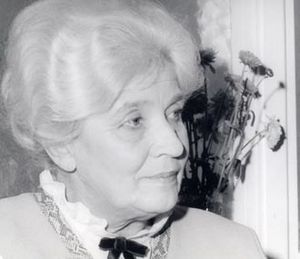Olga Vinogradova facts for kids
Professor Olga S. Vinogradova (1929–2001) was a brilliant Russian scientist. She specialized in neuroscience, which is the study of the brain and how it works. In 1969, she started a special lab called the Laboratory of Systemic Organization of Neurons. This lab was part of the Institute of Biological Physics in Pushchino, Russia. She led this important lab for the rest of her life.
Contents
Olga Vinogradova's Early Discoveries
From the very beginning of her science journey, Olga Vinogradova worked with famous brain experts. She learned about the mind from Professor Alexander Luria. She also explored how our bodies react to new things (called the orienting reflex) with Professor Evgeny Sokolov. Plus, she learned how to study the electrical signals in the brain from Professor Jan Bures.
How the Brain Handles New Information
Professor Vinogradova made big discoveries about how our brains process information. She studied a part of the brain called the hippocampus. This area is very important for memory. She observed how the hippocampus reacted when animals saw or heard new things.
The Hippocampus as a "Comparator"
She came up with an amazing idea: the hippocampus acts like a "comparator." Imagine it like a bouncer at a club for information!
- If the information is new, the hippocampus decides it's important. It helps store this new information in your memory.
- If the information is old or something you've seen before, the hippocampus tells your brain to ignore it. This helps you focus on what's truly new and important.
She wrote about these ideas in her books, like "Hippocampus and Memory." Her work helped us understand how our brains decide what to remember.
The Brain's Rhythms: Theta Waves
A big part of Professor Vinogradova's work focused on something called the "theta rhythm." This is a special electrical wave pattern in the brain, especially in the hippocampus. She and her team found out that certain parts of the brain, like the medial septum nucleus, are naturally able to create these theta waves. These waves are thought to be very important for learning and memory.
Connecting Scientists Around the World
Professor Vinogradova also spent a lot of time helping scientists from different countries work together. In 1958, she helped organize a big meeting in Moscow. For the first time, brain scientists from Western countries were invited to the Soviet Union. This meeting was a huge step! It started many friendships and collaborations between scientists from different parts of the world.
Awards and Recognition
Because of her important work, Professor Vinogradova became famous worldwide. In 1979, she received a special award called the Kenneth Craik award from St. John’s College in Cambridge, UK. This award recognized her amazing contributions to understanding how the hippocampus works.
She was also a member of important science groups like IBRO (International Brain Research Organization) and the European Science Foundation. She was invited to give talks at scientific places all over the world, sharing her knowledge and inspiring others.
 | Emma Amos |
 | Edward Mitchell Bannister |
 | Larry D. Alexander |
 | Ernie Barnes |


